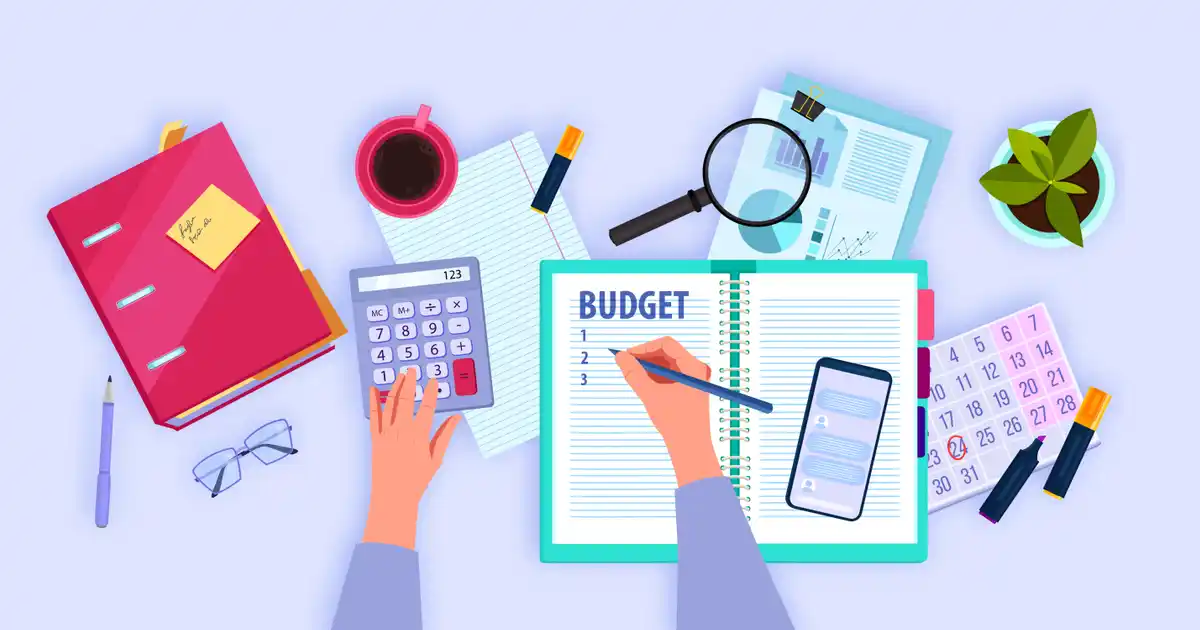If you read the first article in our “Retire at 55” learning path, then you’ve already taken a key step toward early retirement planning: calculating how much money you’ll need to retire at 55. If that number looks daunting, don’t worry. Follow our 11 budgeting tips and you’ll be in a better position to save enough every month to reach your target savings goal. Let’s start with getting a clear picture of where all of your money is going right now.
11. Tracking Expenses: There’s an App for That
Before you can create a budget that allows you to save more for retirement, you need to know how you are spending your money today. The old-school way to track expenses is to create a spreadsheet and enter each expense by hand under categories like “food,” “transportation,” “entertainment,” etc.
The good news is that there are plenty of easy-to-use (and mostly free) apps that automate the process of tracking expenses. Below are our top picks for the best budgeting apps of 2021, which not only automatically track expenses in different categories, but help you stick to your new retirement savings goals:
- Mint (Free on iOS and Android)
- Albert (Free on iOS and Android; Premium version starts at $4/month)
- YNAB: You Need a Budget ($11.99/month after 34-day free trial; available on iOS, Android and desktop)
- Goodbudget (Free on iOS and Android; Premium version starts at $7/month)
- Marcus (fornerly ClarityMoney) (Free on iOS and Android)
 Shutterstock
Shutterstock10. Give Every Dollar a ‘Job’
This gem of budgeting advice comes from the classic “envelope method” of budgeting. With the envelope method, all of the cash you earn each month is divided up in separate envelopes labeled “mortgage,” “groceries,” “student loans,” “entertainment,” etc. That way, every dollar of income is given a specific “job” and knows how it will be spent. When it’s time to buy groceries, you pay with cash from the “groceries” envelope. And if that money starts to run low, you have to get creative to make it last until the next month.
Few of us pay with cash anymore, which makes the envelope method obsolete. However, apps like YNAB are built around the same principle of giving every dollar a job. First, assign dollars to cover all necessary and recurring expenses (food, housing, transportation, clothing, utilities, insurance, etc.). Then, put as many dollars as you can to work funding your retirement savings. That’s going to look different for everybody, but the more you’re able to save each month, the closer you’ll get to your goal, and faster.
9. Figure Out What’s a ‘Necessary Expense’
Remember that your budget is your budget, meaning that your spending categories don’t have to conform to anyone else’s ideas of how money is “supposed” to be spent. And that goes for so-called “necessary” expenses, says Tanja Hester, author of Work Optional: Retire Early the Non-Penny-Pinching Way.
“Don’t worry about what others deem necessary or unnecessary,” says Hester, who also runs the popular blog Our Next Life with her husband Mark Bunge. “Look at it for yourself. If you don’t find that you need new clothes very often, maybe because you’re not going into the office everyday, then cut a bunch of your clothing spending out.”
 Shutterstock
Shutterstock8. Set It and Forget It
Automation is a powerful tool for sticking to a budget. Whether it’s through online banking or a budgeting app (or both), try to pay all of your recurring expenses through automatic, scheduled withdrawals from your checking account. And that includes the money that you intend to stash away as savings every month.
“I’m a really big fan of automating things as much as possible,” says Hester. “If you’re trying to save $500 a month, then schedule an automatic transfer every month. Don’t rely on willpower, which countless studies have shown we have a limited supply of. If you never see the money, you won’t miss it.”
7. Keep What You Have
In both Work Optional and her upcoming book, Wallet Activism, Hester encourages people to rethink the dominant consumer culture that tells us to constantly crave more, bigger, newer and better. It’s very difficult to reach your long-term savings goals if you can’t resist the urge to continuously upgrade.
“Transportation and housing are the two biggest expenses in most people’s lives,” says Hester. “Those are areas where you can see huge gains in what you can save and invest if you simply keep what you have. If you can stay in the home where you are and keep a car for 20 years (most cars built today are able to last that long), the amount of money you can save just on those two decisions is massive.”
 Shutterstock
Shutterstock6. Shore Up Your Emergency Fund
Unexpected expenses can sink your savings like a torpedo. Whether it’s an unforeseen medical emergency, a natural disaster, or a major repair to your home, it can set back your budget for months or more. Hester says there’s a solution for that, too.
“People underestimate the importance of an emergency fund,” says Hester. “The whole idea of an emergency fund is to cover all of the stuff that you can’t anticipate. One of your first savings goals, even before saving for retirement, is to have enough money in an emergency fund to cover at least six months of basic living expenses.”
Once that emergency fund is in place, you can rest easy and save aggressively.
5. Give Your Savings a Raise, Not Your Lifestyle
Everybody loves to get a raise. However, our immediate instinct is to raise our lifestyles accordingly. Instead, says Hester, don’t let that new chunk of money even make it into your checking account. Increase the amount that’s automatically going into your savings and investments, instead.
“Getting a raise is a good time to see if you can save more or pay off more debt, so you don’t even feel that pinch,” says Hester.
 Shutterstock
Shutterstock4. Surround Yourself with Savers
When Hester and her husband lived in Los Angeles, getting together with friends meant going out to dinner and spending $50 to $100 a person on a fancy meal. She says it didn’t occur to them to “challenge the status” quo by offering to host a potluck at their house or taking a picnic to the park. When they retired early and moved to Lake Tahoe, things changed.
“It helps so much to have some friends or a social circle who have the same spending philosophy as you,” says Hester.
If you’re serious about sticking to a budget, surround yourself with people who are on the same path and who will support you in choosing less expensive ways to have fun.
3. Travel Smarter
Like many of us, Hester loves to travel. However, travel can be tremendously expensive. When it comes to discretionary expenses like travel or entertainment, Hester’s advice is to think beyond the glossy brochures and expensive hotels. Instead, figure out what you actually want out of a travel experience.
“Do you need to sleep on 400 thread count sheets or do you just want to be in a new place and see new things?” Hester asks. “There are always ways to make travel cheaper. Stay at 1-star hotels or travel during off-peak seasons when everything is cheaper and cities are less crowded.”
 Shutterstock
Shutterstock2. Fun Money is Critical
Whatever you do, don’t budget $0 for entertainment — even if it means sacrificing some monthly savings. Extreme penny-pinching isn’t sustainable and will inevitably lead to “budget burnout” aka “frugal fatigue.” After all, life is still supposed to be fun sometimes.
“Always make sure you’re building in some amount of fun money,” says Hester, “money for things like self care, letting off steam, rewarding yourself for the hard work of sticking to a budget, whatever it looks like for you. That’s a really important line item in your budget and you shouldn’t scrimp on it.”
1. Don’t Be Afraid to Switch Budget Gears
If you’ve never been on a budget before, it’s going to take an adjustment period. It might feel like a big sacrifice at first, but keep your long-term goals in mind. Hester says that if you’re feeling burned out and really tempted to quit, try changing things up instead.
“Give yourself permission to try different budgeting methods and apps,” says Hester. “Maybe the one you’re using is not the best one for you.”
And don’t forget that even budgets aren’t set in stone. The only good budget is the one you will actually keep.
“If you feel like you’re working all the time to meet your savings goal and constantly questioning whether it’s worth the sacrifice, I think that’s a sign that something needs to change,” says Hester. “Either it’s time to increase your fun money budget or take more time off.”
 Shutterstock
ShutterstockWhat’s Next
A big part of sticking to a budget is cutting back on unnecessary costs and looking for new ways to make money. In the next article in our “Retire at 55” learning path, we’ll talk about the revered “Super Savers” and how their methods can help you save more money to put towards retirement.








